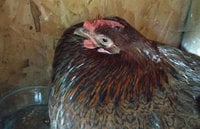- Jan 12, 2013
- 35
- 6
- 84
I noticed that one of my hens stayed on her outdoor roost all day yesterday. When I went to put her inside, she made it clear she did not want to be moved - she is not walking at all. I put her inside the hen house and fed my girls and she made no move to eat. So I gave her food where I put her and got her water. I thought she may have had something wrong with her crop but but upon further inspection, it feels like her entire breastbone is off. You can feel a bone (assumed) when you hold her between her legs and it feels like her breastbone is coming up in front of her neck. My teen was the 4H kid and she said this is all bone - not a crop issue. Last week a bobcat tried to get my chickens and they all were in hiding in the hen house. I don't know if she could have gotten injured in her panic? The bobcat did not get in to them. She is young - we got her from the feed store in May I believe. Not the best photo but you can see the swelling up by her face - it is solid. Is there anything I can do?





